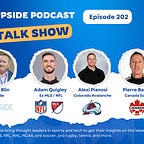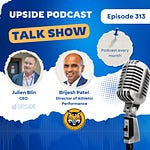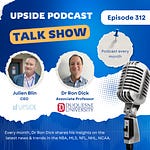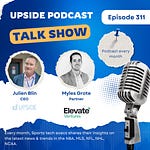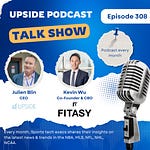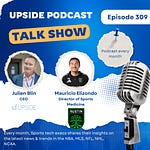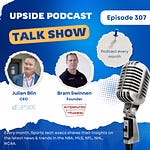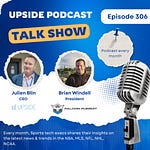This week we had the honor to interview again a group of sports performance experts.
Pierre Barrieu, the director of performance for the Canadian men national soccer team.
Alexi Pianosi, the head S&C coach for the Colorado avalanche (NHL team).
Adam Quigley, an experienced athletic trainer in the MLS (LA Galaxy), NFL (Saints) & US Soccer national teams.
You can read the full transcript of the podcast interview with Pierre, Alexi and Adam located at the top of this blog post.
Here are some of the best quotes of our conversation with them:
Q1. Joining a new performance staff: What steps would you take to quickly familiarize yourself with a team's existing performance programs and protocols? How important is it to understand a team’s history and traditions when joining as a new performance professional?
Pierre Barrieu:
"When I join a new team, I approach the first year as an audit. I make it clear to everyone that we are here to evaluate what works and what doesn’t. This isn’t about sweeping changes right away—it’s about understanding the culture, values, and systems already in place. I use this time to observe and integrate while being transparent about the process. By the end of that period, we reassess everything, ensuring we’ve built a solid foundation for sustainable improvements."Alexi Pianosi:
"The most important thing when joining a new performance staff is to seek to understand, not to be understood. It’s about observing and listening—understanding what the organization thrives on and where it faces challenges. Rather than coming in with preconceived notions or a ‘one-size-fits-all’ approach, I focus on tailoring solutions to the team’s needs. By prioritizing relationships and understanding the dynamics, I position myself to contribute meaningfully while respecting the existing structure."Adam Quigley:
"As someone entering a new team in a support role, I’ve learned that the honeymoon phase is critical for building relationships and trust. During this time, I try to observe everything—what’s working, what isn’t, and how I fit into the puzzle. My role often involves doing whatever it takes to allow the heads and directors to manage players effectively. It’s not about making sweeping changes immediately but rather learning the team’s rhythm and ensuring I’m aligned with their goals before taking any bold steps."
Q2. ChatGPT: I use ChatGPT frequently to analyze data, create charts off of excel sheet. Do you use ChatGPT frequently? What are the best use cases you have find so far?
Adam Quigley:
"I use ChatGPT as a virtual whiteboard to help me brainstorm ideas and refine my thoughts. For instance, I’ve used it to summarize lengthy research articles into bullet points and even to review contracts by highlighting potential concerns, such as clauses that might limit future opportunities. It’s not a substitute for deep expertise, but it’s an excellent tool for generating ideas, organizing thoughts, and identifying issues I might have missed."Pierre Barrieu:
"While I don’t use ChatGPT extensively, I recognize its potential. I’ve used it for theoretical topics or creating summaries and frameworks for reports. For example, when I need to draft a one-page summary for FIFA or UEFA, it provides a great starting point. However, in practical or field-based scenarios, I still rely on my observations and expertise. It’s a useful tool, but it requires you to add your personal touch and ensure the content aligns with your unique context."Alexi Pianosi:
"I’ve explored tools like Elicit, which is like ChatGPT but tailored for research. It’s a fantastic resource for summarizing articles and conducting quick literature reviews, especially when I need to point myself in the right direction on a specific topic. I’ve also seen colleagues use ChatGPT for coding and developing performance-related platforms, which has been hugely beneficial in their workflow. For me, it’s more about enhancing efficiency than replacing human expertise."
Q3. Concussion: What are the best modalities that you have used in your sports to help prevent and manage concussions?
Alexi Pianosi:
"The more we learn about concussions, the more we realize how much we don’t know. Every case is unique because the systems affected—be it the vestibular system, motor control, or autonomic functions—vary from person to person. Preventing concussions entirely in sports like hockey might be unrealistic given the inherent physicality, but the focus needs to shift toward better identification, individualized rehabilitation, and ensuring there are no lingering effects before returning to play."Pierre Barrieu:
"In football, the introduction of the concussion substitution rule has been a game-changer. Previously, teams hesitated to pull a player off the field due to the tactical implications of losing a substitution. Now, with the concussion sub, we can prioritize player safety without those concerns. It’s a step in the right direction, allowing medical staff to assess players thoroughly and make decisions based solely on their well-being, not the game’s outcome."Adam Quigley:
"Having medical spotters in the stands has significantly improved how we manage concussions. These spotters provide an independent perspective, often catching subtle signs of a concussion that sideline staff might miss amid the chaos of the game. Additionally, advancements in cognitive data collection and reaction-time testing are helping us not just treat but also better understand the cognitive effects of concussions, which is critical for long-term player health."
Q4. Offseason: How do you use the offseason for your personal growth, whether through education, networking, or skill-building? Are there specific technologies or tools you explore or adopt in the offseason to enhance performance?
Pierre Barrieu:
"For me, the offseason isn’t truly downtime—it’s the international season. However, during the club season, I use my time wisely to stay sharp by visiting players in their club environments and learning from their best practices. I also prioritize staying updated with new technologies and methods by engaging directly with companies or clubs using cutting-edge tools. Personal growth, whether through education or networking, is less about a specific time of year and more about continuous curiosity and discipline."Adam Quigley:
"The offseason is an important time not just for the players but also for us as practitioners. While I use part of it for recovery, I also take the opportunity to focus on personal growth—whether that’s attending symposiums, exploring new modalities like dry needling, or even reflecting on what I can do better. We expect players to return after the offseason better than they left, and we should hold ourselves to the same standard."Alexi Pianosi:
"For strength coaches, the offseason is really our in-season for making performance gains. With less travel and fewer day-to-day demands, it’s the perfect time to focus on strength, power, and other areas that might take a backseat during the competitive season. It’s also a chance to pursue personal development, whether through formal courses, self-study, or networking. Growth is a continuous process, and the offseason offers the perfect window to dive deeper into areas that can elevate our craft."
Q5. Mbappé’s struggles:
Pierre Barrieu:
"Mbappé’s struggles at Real Madrid aren’t just about adapting to the tactical system—it’s also about the team’s transition. It’s worth noting that Mbappe has been playing for a while, his performances last year with PSG and more specifically in the last Euro with France were average. Also, this is not the same Real Madrid as before. Toni Kroos has retired, Luka Modric isn't as central, and the team is evolving and has been ravaged by (long term) injuries”.“Additionally, he’s playing out of position, with Vinícius Junior occupying his preferred wide-left role. While there’s been a slight dip in discipline and focus over the past year, Mbappé is only 25 and has plenty of time to regain his form. This phase is more about adjustments than a decline in ability.”
Adam Quigley:
"When you’re at the peak of your career at such a young age, like Mbappé, the expectations are astronomical. He’s expected to be better than Messi or Ronaldo, which is an immense burden. Anything less than perfection is seen as failure, which can be tough to navigate. Switching teams, languages, and tactical systems adds another layer of complexity. That said, Mbappé has all the tools to adapt, and with the right adjustments, he’ll find his rhythm again."You may also like:

